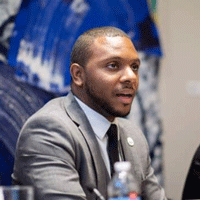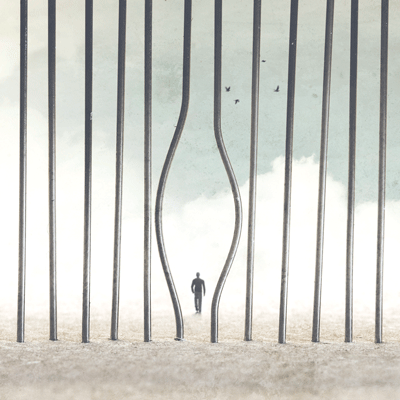Putting the keys to the law in the hands of those most impacted by it
By Elizer Darris, Emily Hunt Turner, and John Goeppinger
An Excerpt from an Expert: Elizer Darris
 The full scope and power of the law impacts those who have had their liberty legally taken away more than anyone else on this planet. From an absence of liberty comes an interest in mastering the law not out of curiosity, or as an academic exercise, or strictly in pursuit of a career. For those who have had their liberty stripped as a result of legal instruments being filed and a legal process carried out to conclusion: learning the rudiments of law is a vital vehicle for freedom.
The full scope and power of the law impacts those who have had their liberty legally taken away more than anyone else on this planet. From an absence of liberty comes an interest in mastering the law not out of curiosity, or as an academic exercise, or strictly in pursuit of a career. For those who have had their liberty stripped as a result of legal instruments being filed and a legal process carried out to conclusion: learning the rudiments of law is a vital vehicle for freedom.
For some, learning how to properly navigate the deep, mystified waters of law while behind prison walls can easily become an obsession. For others who have resigned themselves to the notion that they may never leave prison alive, learning the law becomes one of the few avenues they have to prevent prison officials from mistreating or even killing them (whether that is a slow process through attrition and medical neglect or a process that happens expeditiously through violent staff assaults).
I went into the prison system as a teenager who had yet to graduate from the eighth grade. I was given a life sentence and told that I would spend “the rest of my natural life in the care of the commissioner of correction.” My knees buckled upon hearing those words as each one fell on me like a ton of bricks. The sense of hopelessness that washed over me was overwhelming. I spent the first part of my incarceration in turmoil and I struggled mightily, my maladjustment an intentional and strategic message I was sending the universe: I would not conform to the environment.
Fortunately for me, some of the older, wiser inmates took notice of me and saw beyond the ungainly exterior that I projected. They saw my worth and began to challenge my thinking and approach to life. They provided me with books and provokingly deep conversations. During the course of my studies with one of them, he looked at me and said, “You know you don’t have to die in here. Start studying law.” And I did. I signed up to go to the law library every single chance I got. We would hold weekly discussion groups in the prison unit during the time we had out of our cells where we would break down briefs, judicial decisions, legal journal articles, and books that explained the technical aspects of legal writing. Sometimes we would engage in hotly contested debates on the substance of legal arguments and our respective opinions on whether or not various standards of review were satisfied by the arguments presented by our compatriots.
It is with this backdrop of deep and meaningful training in the law that I began working to articulate a legal theory that, once reduced to writing and filed by my appellate attorney, ultimately led to my liberation when the Minnesota Supreme Court reversed my life sentence on appeal.
I am a prime example of someone who, through the study of law, has been able to come out and forge lasting change that continues to impact our community deeply. Although I did not have access to a formal law degree while in prison, the legal training I received from towering legal scholars and the methodical and practical approach that was drilled into me by so many years of study allowed me to excel as a community organizer once I returned home. From there, I worked as an educator, a political field operative, a motivational speaker, and as a community power broker. As a result, I was hired by the ACLU of Minnesota where I created and built out the Smart Justice Campaign, which is a national ACLU effort to impact mass incarceration by 50 percent. To date, our team has worked on cash bail reform, reducing technical violations, prosecutorial reform, expanding the electorate to include impacted voices and communities, policing reform, warrant forgiveness, and civil asset forfeiture reform—all efforts to which my legal training added immense value.
Recently, I was appointed by Gov. Tim Walz as the first formerly incarcerated member of the State Board of Public Defense. I was also recruited by Attorney General Keith Ellison to be one of the founding board members of the newly formed Conviction Review Unit (CRU). The CRU will have the power to review cases of those incarcerated who are proclaiming actual innocence or who believe that they have excessive sentences. Who better than someone like me to work on these efforts?
None of this would be possible if I had not embarked on a journey to understand and embrace the power of the law as an engine to invest in our community and to impact my inner and outer world. My journey with the law was my saving power.
Access Is Everything

Nobody warrants access to legal education more than someone who has been directly impacted by legal processes and racialized legal outcomes. Yet, notwithstanding notable movement with “college behind bars” in Minnesota and nationwide, currently incarcerated scholars do not have access to ABA-accredited law degrees. What’s more, formerly incarcerated scholars face egregious barriers to law degrees and professional licensure for a variety of reasons: one, morality clauses disqualify those with criminal records from gaining admission into law school and sitting for the bar exam; two, law degrees generally require undergraduate degrees and many people in prison do not have access to bachelor’s degrees; and, three, law schools and bar associations that are amenable to individuals with low-level offenses, such as DUIs, are generally not amenable to individuals with felony convictions. Consequently, the legal field is largely devoid of students and practitioners carrying firsthand experience with incarceration, despite the fact that ABA law schools have conferred nearly two million law degrees over the last 50 years.
There are three distinct issues inherent in the lack of representation outlined above; issues that are thwarting critical progress toward a legal system that is wholly representative. The first issue is centered on due process and access to liberty. Although prison law libraries are invaluable treasures nested within the walls of nearly all correctional facilities, many no longer have the physical books that were once their hallmark. Instead, with little to no technical training or familiarity with online legal platforms, residents are handed tablets and sent on their way. Beyond this, most scholars who are looking to master all of the varying components of the law (legal research and writing, post-conviction remedies, appellate processes, etc.) require a law degree. When incarcerated legal scholars do not have access to the full breadth of an ABA-accredited legal education, they are, in turn, denied the full suite of legal tools and avenues that could directly lead to their liberation—undermining the core pillars of justice and freedom that frame the scaffolding of our democracy.
The second issue stems from the abrupt halt in practicing law that prison litigators, or “jailhouse lawyers,” experience upon release. Under Johnson vs. Avery, the Supreme Court held that inmates are allowed to assist other inmates with legal matters, including filing petitions and preparing writs of habeas corpus. Under this rule of law, established in 1969, prison litigators across the country have been engaging in the practice of law not only by filing pro se petitions but also by assisting others with their legal matters. Yet, upon release, should prison litigators directly leverage these legal muscles by representing others, they can be rearrested for practicing law without a license. Said litigators also no longer have standing to file prison conditions suits, and the legal chops that they have developed go unrecognized by the legal discipline. This is a tremendous loss not only for individuals who wield deep legal expertise but also for the community who no longer gets to bear the fruit of their efforts.
The third issue hinges on advancing the legal discipline—a discipline that has historically been plagued by racialized legal processes. When those with firsthand experience of these legal processes are denied formal on-ramps into the legal field by virtue of morality clauses that make judgment calls on their character and fitness, they are simultaneously denied the opportunity to shape the contours of the legal discipline. This is, most importantly, a social and economic disservice to thousands of individuals who would otherwise be qualified to study and practice law. It is also a grave disservice to the legal discipline as it is not benefiting from—and laws are not advancing with—the wealth of generational legal knowledge and expertise held by currently and formerly incarcerated legal scholars and those whose lives have, in many cases, been upended by the legal system.
A Minnesota Solution
A solution that addresses the aforementioned issues by placing the keys to the law in the hands of those most impacted by it is being developed in Minnesota. Collectively forged by currently and formerly incarcerated leaders, law professors, the Minnesota Department of Corrections, Mitchell Hamline Law School, North Hennepin Community College Paralegal Program, Until We Are All Free, and All Square, this solution hinges on a Prison-to-Law Pipeline, a reentry clinic, and companion law firm that will address the legal void described above and racialized legal outcomes by (1) ensuring that currently incarcerated Minnesotans have access to ABA-accredited legal degrees, (2) creating employment and experiential opportunities for currently and formerly incarcerated legal scholars, and (3) undertaking impact litigation centered on the effects of pre- and post-release barriers that Minnesotans with criminal
records face.
The Pipeline
The Prison-to-Law Pipeline (PLP) is a program that opens the door to ABA-approved paralegal degrees and ABA-accredited law degrees for currently incarcerated Minnesotans. The Pipeline’s first cohort, which entails six prospective paralegal students and two prospective law students, is slated to commence in June and August, respectively. To our knowledge, this program will facilitate the first-ever currently incarcerated juris doctorate students who will be plugging into existing courses from Shakopee and Stillwater correctional facilities. Mitchell Hamline School of Law is exploring the possibility of providing the J.D. education, in addition to partnering in the development of the program in general.
There are several reasons why the PLP will yield lasting change in the legal discipline. One, incarceration has historically been used as a lever for disinvestment, specifically as it relates to legal education. Yet there is nobody better equipped to learn the law than someone who has been impacted by it. As stated by Maureen Onyelobi, a PLP scholar who recently took her LSAT exam, “We have a drive and a passion to learn the law that most have never seen before because we know what it is to be in here; we know what it’s like to be on this side of the law.” As Elizer Darris so eloquently illustrated, learning the law while in prison was not only a path to spiritual liberation, it also led to his physical freedom.
Two, the legal discipline, and the community at large, has already benefited from the expertise of formerly and currently incarcerated legal scholars who, without ABA-accredited legal degrees, have founded companies, drafted legislation, taught at legal institutions, sat on state boards of public defense, drafted and filed legal petitions, led campaigns, and mentored others towards post-conviction relief. The PLP will build on this expertise by formalizing accredited pathways to legal education because of one’s experience with incarceration, recognizing that the yield of legal practitioners with lived experience is an essential element of a fully representative legal discipline and a step towards healing the effects of flawed legal processes, including, but not limited to, cash bail, disparate sentencing structures, prosecutorial discretion, unconstitutional arrest practices, the criminalization of drugs and drug-related crimes, and other regimes that have created mass incarceration.
From the client and client-outcomes perspectives, there is also medical research to support the importance of having a shared lived experience with one’s professional practitioner. A 2017 meta-analysis in the Journal of Racial and Ethnic Health Disparities concludes that patients have better experiences and better health outcomes when provided care by a racially concordant physician. Although this study pertains to the medical field, and is applied directly to racial concordance, the PLP relies on a similar theory: training legal practitioners with similar lived-legal-experiences to their clients will result in better representation and more positive legal outcomes. Individuals with lived experience of the processes and collateral consequences of the law are uniquely positioned to provide more effective, client-focused legal services. There is a level of a self-representation that will inevitably lead to better legal representation. People don’t typically come to lawyers on their best day, but if clients are able to see lawyers, legal advocates, and navigators that have been through what they have been through, there is a greater chance the client will trust them with the difficulties they have experienced.
As it relates to directly transferable legal education, the PLP will ensure that those who secure legal degrees while in prison can fully leverage those degrees upon release. Presently, only nonaccredited paralegal programs are available to those in Minnesota correctional facilities. Though the education obtained through these programs is undoubtedly valuable for those wanting, or needing, to study jurisprudence while in prison, the degrees themselves are limited in scope and carry little weight in the legal discipline upon release.
Finally, the PLP will preserve judicial resources due to the expected increased quality of petitions and briefs filed by those in prison, which, in 2017, comprised 26 percent of the federal docket in the district court alone. This is not to suggest that pro se petitions are drafted with anything but the utmost care and craft, but it is to highlight that these petitions are being drafted by individuals who have not had access to the highest standard of legal tools and training, an issue that the PLP helps to eradicate.
The Firm and Reentry Clinic
Reimagining the legal system requires reimagining the scope, breadth, and mechanistics of law firms and legal clinics. Considering the potential licensure and employment issues that come as a collateral consequence of incarceration, the nonprofit All Square Firm (Firm), slated to open in 2022, will employ PLP graduates and implement new pathways for incarcerated legal scholars to engage in the legal discipline.
The Firm will approach law through the needs and expectations of the community we serve and create innovative ways for those with the lived experience to engage in legal work—with or without a legal degree and/or professional licensure. For example, General Rules of Practice, Rule 110.04, provides permitted acts that “self-help personnel,” or non-attorneys, can legally be engaged in. The three buckets of actions established in this law break down a potential employment structure. Entry level employees will be the tip of the spear, trained to educate and direct the community to appropriate legal resources; tasks clarified in Rule 110.04(a). The next level of employees will be engaged in more direct assistance with forms, court scheduling, and other more technical needs that do not require a license. See Rule 110.04(b). Finally, Rule 110.04(c) lays out the prohibited tasks for non-licensed individuals. These tasks would be formal legal services provided by a licensed attorney. Simply put, while this is a relatively new ground, there are avenues through which individuals precluded from licensing may have the ability to engage and assist in legal services.
Given the importance of clinical opportunities for students, the Firm will also partner with Mitchell Hamline Shool of Law’s Legal Assistance to Minnesota Prisoners (LAMP) and Reentry Clinic to work with PLP scholars whether they are actively incarcerated or have returned home. In addition, the Firm will operate as a nexus for impact litigation in partnership with the Clinic and private Minnesota law firms. Efforts in the litigation arena will be aimed at the systemic predatory practices and barriers that currently and formerly incarcerated Minnesotans face, specifically as it relates to bail, housing, and consumer protection.
Conclusion
As the legal discipline continues to reckon with racialized legal doctrine, statutes, and processes, and the systemic disinvestment of those who have been directly impacted by legal procedures, the community needs the law to do what we’ve been told it must do: evolve and change to meet the needs, and the demands, of this era; an era haunted by the heinous murder of George Floyd and countless other Black and Brown citizens whose lives were stolen by the legal system and the powers that perpetuate it.
We submit that this evolution is predicated on ensuring that currently and formerly incarcerated individuals have avenues to ABA-accredited legal degrees, legal licensure, and the legal discipline at large—towards a legal landscape that can be reshaped by the very individuals it has impacted. This transformation will yield the comprehensive reform that our community deserves.
How you can help
We are calling on the legal community across the state of Minnesota tojoin us in this transformation. To help fund the tuition of the first-ever currently incarcerated juris doctorate students, contribute here: allsquarempls.com/legalrevolution
To sponsor or contribute to the Firm, email: ASFirm@allsquarempls.com
Thank you to the early sponsors
Ballard Spahr, LLP
Barnes & Thornburg, LLP
 Elizer Darris is the Co-Executive Director of the Minnesota Freedom Fund. He works to reduce mass incarceration, reform the criminal legal system and create racial equity. As a juvenile, he was sentenced to life in prison. But through the study of law, he worked with his state-appointed counsel to get his life sentence reversed on appeal. Upon his release, Darris became a business owner, consultant, educator, community organizer, youth mentor and motivational speaker.
Elizer Darris is the Co-Executive Director of the Minnesota Freedom Fund. He works to reduce mass incarceration, reform the criminal legal system and create racial equity. As a juvenile, he was sentenced to life in prison. But through the study of law, he worked with his state-appointed counsel to get his life sentence reversed on appeal. Upon his release, Darris became a business owner, consultant, educator, community organizer, youth mentor and motivational speaker.
 Emily Hunt Turner is a civil rights attorney with a background in architecture, law, and public policy. She is the Founder and CEO of All Square, a nonprofit social enterprise that invests in formerly incarcerated leaders through an entrepreneurial fellowship and a forthcoming law firm. Prior to All Square, she spent five years as an attorney for the Department of Housing and Urban Development (HUD) tackling issues of housing discrimination and segregation.
Emily Hunt Turner is a civil rights attorney with a background in architecture, law, and public policy. She is the Founder and CEO of All Square, a nonprofit social enterprise that invests in formerly incarcerated leaders through an entrepreneurial fellowship and a forthcoming law firm. Prior to All Square, she spent five years as an attorney for the Department of Housing and Urban Development (HUD) tackling issues of housing discrimination and segregation.

John D. Goeppinger is a Juris Doctorate candidate at the University of Minnesota Law School and a Robina Public Interest Legal Scholar for All Square. Prior to law school, he taught English in South Korea, worked on the anti-fracking movement and ban in New York State, conducted community outreach and engagement for MNsure, and operated an independent grant writing business.